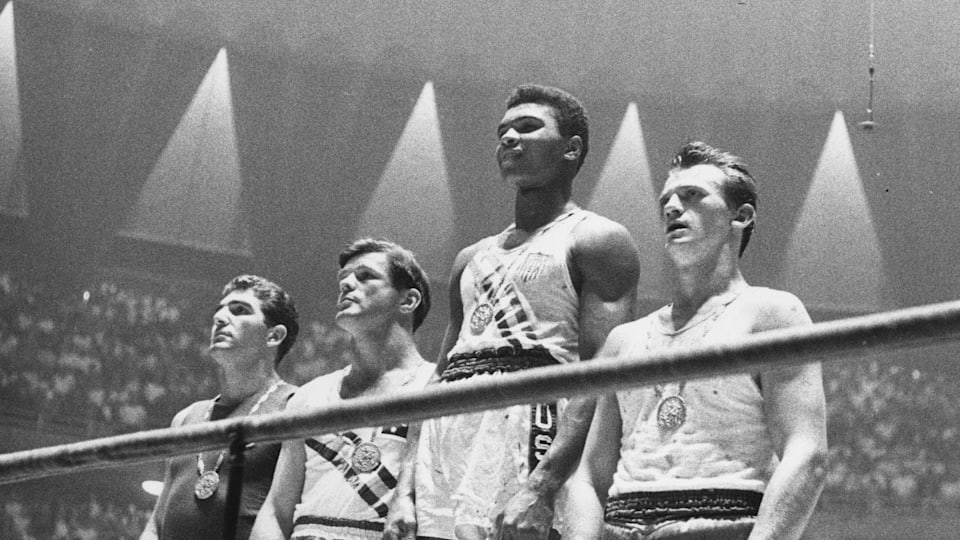Stolen cycle to Olympics gold: origin of the Muhammad Ali legend
Victory for Muhammad Ali, then called Cassius Clay, at Rome 1960 put the American boxer on the path to be 'The Greatest'.

It all begins with a stolen bike.
When a 12-year-old Muhammad Ali, then known as Cassius Clay, went to a fair at the Columbia Gym in his hometown of Louisville back in 1955, his pride and joy - a red and white Schwinn bicycle - went missing.
Having quickly gone from two wheels to no wheels, the boy Ali was incandescent with rage, promising to "whoop" the thief if he ever laid hands on him.
Muhammad Ali’s angry outburst caught the attention of a local police officer, Joe Martin, who invited him to channel his fury by taking boxing classes at his gym.
The rest, as they say, is history. From that chance encounter, a legend was born.
Within six weeks, Ali had won his first fight.
Within six years, Muhammad Ali had a gold medal hanging around his neck at the Olympic Games in Rome.
‘Turbulent’ journey to Rome 1960
Muhammad Ali traveled to the Rome 1960 Olympics to represent the United States as a callow, relatively unknown 18-year-old.
In fact, the then-light heavyweight nearly didn't travel to Italy at all.
A turbulent flight to California for the Olympic trials had put Ali off flying.
Only after some more gentle encouragement from his mentor, Joe Martin, was Ali persuaded to get on the plane.
Reputedly, the teenage boxer did insist on taking a parachute on board for the journey - just in case.
Muhammad Ali’s Olympic medal
As befitting a man nicknamed 'the Louisville Lip', Muhammad Ali soon began making his presence felt around the Olympic village, becoming a hugely popular figure.
But as well as making friends outside the ring, Ali began making an impression inside it too.
In his first bout at the Rome Olympics against Belgian Yvon Becaus, the referee had to stop the contest in the second round, fearing a brutal knockout.
His quarter-final opponent was Russia's Gennady Shatkov, a man who had won Olympic gold in the middleweight division four years earlier.
Despite his impressive pedigree, he was no match for the American - who swept to a 5-0 triumph on points.
That scoreline was replicated in his next bout against Australia’s star pugilist Tony Madigan. Although Muhammad Ali had to dig deep at times, he had made it through to the light heavyweight Olympic final.
Standing in the opposite corner to Muhammad Ali in Rome’s Palazzo dello Sport stadium on September 5, 1960, was the imposing frame of Poland's Zbigniew Pietrzykowski.
Pietrzykowski was stronger and vastly more experienced than his rival, and Ali initially struggled to adapt to his rival's southpaw style.
The 25-year-old Pole edged the first two rounds, but in the final round, Muhammad Ali came to the fore.
With his superior stamina and quick combinations, the American left his rival in a battered - but still upright - state by the final bell. The judges were unanimous once again. Olympic gold was his.
Muhammad Ali: Olympic champion
Muhammad Ali's joy was unconfined after his triumph, telling reporters about what being an Olympic champion meant:
"I didn’t take that medal off for 48 hours. I even wore it to bed. I didn’t sleep too good because I had to sleep on my back so that the medal wouldn’t cut me. But I didn’t care, I was Olympic champion."
Ali's rapid, shuffling style had not always found favour amongst boxing 'purists', but there was now no denying his quality.
Much like his painter-musician father Cassius Marcellus Clay Sr., whom Ali dubbed ‘the fanciest dancer of Louisville’, the ace boxer could ‘float like a butterfly’. But his dance floor was the boxing ring.
The fact that he ‘stung like a bee’ with his rapid punches, made him a nightmare for opponents and a dream to watch for millions of boxing fans all around the world.
Soon after his return to America, Muhammad Ali turned professional and made his debut against Tunney Hunsaker on October 29th, 1960.
The journey to becoming 'The Greatest' was well and truly underway.
Championing the Olympic spirit
At the age of 22, Cassius Clay Jr. became Muhammad Ali after converting to Islam and changing his name.
A staunch critic of the Vietnam War, Ali stuck to his guns, or rather shunned them, and refused to be inducted into the armed forces. It was a move that came at a huge personal cost, denying him the opportunity to box for nearly four years in the prime of his career.
Even after being diagnosed with Parkinson’s disease, Ali traveled all around the world spreading the message of peace and brotherhood, representing the true spirit of the Olympic movement.
He returned on the Olympic stage at the Atlanta 1996 Olympics as the final torch-bearer, who lit the Olympic flame for that edition.
At London 2012 - four years before his death - Ali escorted the Olympic Flag to the stadium for the opening ceremony.
Like the eternal Olympic flame, his legend continues to burn bright and proud.
